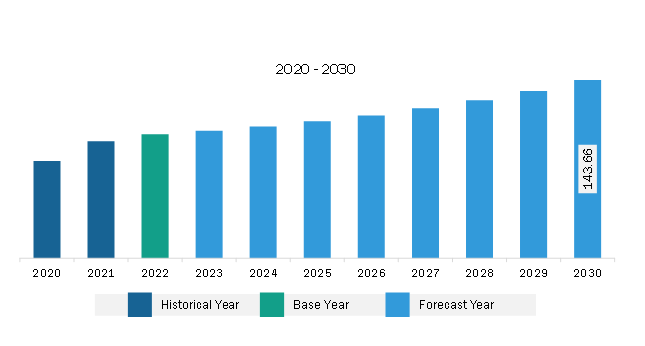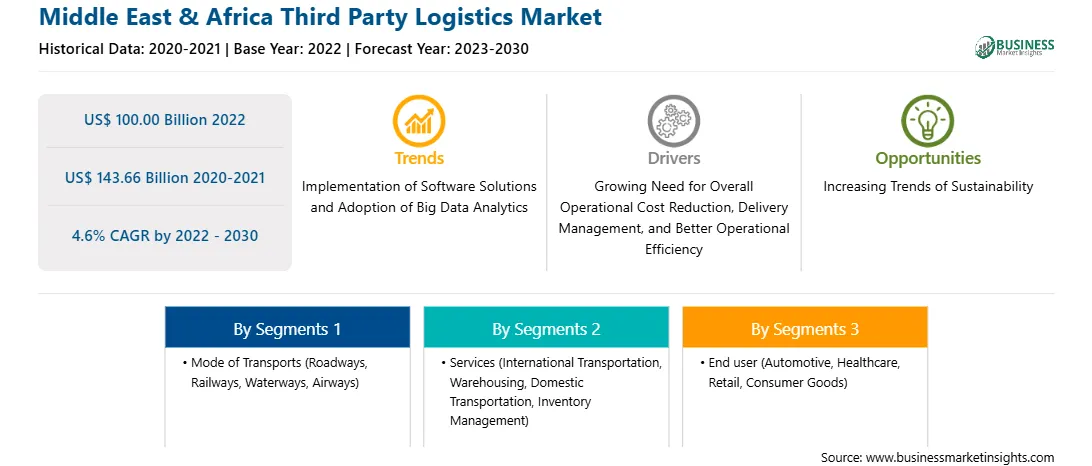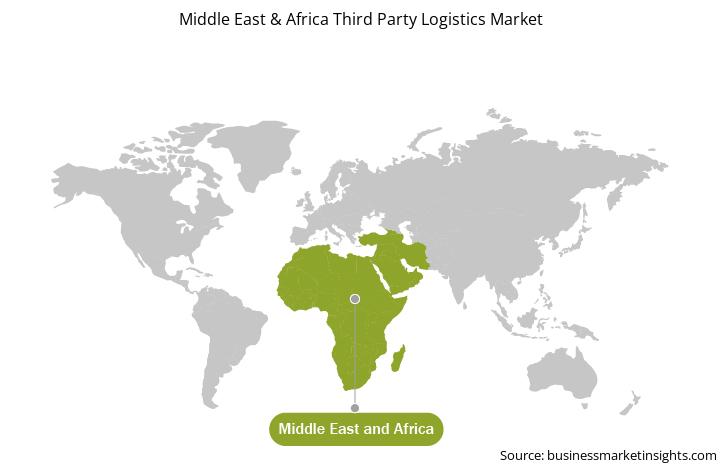The Middle East & Africa third party logistics market was valued at US$ 100.00 billion in 2022 and is expected to reach US$ 143.66 billion by 2030; it is estimated to register a CAGR of 4.6% from 2022 to 2030.
Implementation of Software Solutions and Adoption of Big Data Analytics Bolsters Middle East & Africa Third Party Logistics Market
Logistics is a complex process that involves the flow of multiple goods and information across the network of suppliers, carriers, and warehouses. This complexity can be handled using software systems, which allow the analysis of real-time and real-world data. This implementation of software systems improves lead times, reduces excess inventory levels, helps in resolving warehousing issues, and decreases inventory costs. Increased competitiveness in the industry is the major reason for third-party investing in automation and digitization. In the coming years, third-party logistics firms are expected to shift toward mobile technology to reduce paper records.
The adoption of RFID-enabled devices is also expected to store data for easy transport that will also simplify tracking and identification of products. Software related to transportation management systems will reduce inefficiency and costs. Furthermore, the usage of speech recognition software in warehouse management system communications will help with order turnaround and inventory records while lowering employee training needs. Along with this, the acceptance of cloud-based technology in third-party logistics organizations will respond to demands by recognizing the need for client access, allowing them to address seasonal trends better.
Big Data is another technology that is transforming the third-party logistics industry notably. By analyzing financial and operational KPIs and providing the best shipping experience, a data-driven strategy aids third-party logistics service providers in maintaining flexibility. Third-party logistics service providers will be able to turn data into insightful knowledge by developing data science technologies and other resources. End-to-end supply chain visibility, improved resource planning, and cost reduction are a few of them. According to a study done by Council of Supply Chain Management Professionals in 2021, 98% of third-party logistics organizations and 93% of shippers agree that data analytics are essential for making wise business decisions. In fact, 71% of them think data analytics significantly improves the effectiveness and quality of their company. Thus, advancements in third-party logistics such as IT solutions, supply chain software, higher use of mobile technology and Big Data, and greater inclination toward the use of cloud-based systems will help companies meet the real-time demand for services.
Middle East & Africa Third Party Logistics Market Overview
Countries in the region are now focusing on the growth of the non-oil sectors. As a result, governments are heavily investing in developing infrastructure. For instance, Saudi Arabia is planning to invest ~US$ 133 billion by 2030 in its transportation & logistics sector. With this investment, the Kingdom is planning to build ~300 projects with the help of private companies. Thus, many companies enter into partnerships to build logistics centers. In March 2023, Armaco and DHL announced that they were building a logistics and procurement hub in Saudi Arabia that would offer services to customers from the industrial, energy, chemical, and petrochemical sectors. The third-party logistics industry in the Rest of Middle East & Africa experiences a significant transformation driven by multiple factors, including economic growth, infrastructure development, and increased globalization. This region comprises diverse countries, each presenting its unique opportunities and challenges for the logistics sector. Economic growth is a key driver of the 3PL industry in the Rest of Middle East & Africa. As nations in the region continue to expand, there is a growing demand for efficient logistics and supply chain solutions to support various industries, including oil & gas, manufacturing, and consumer goods. These initiatives have attracted both international and regional 3PL providers to establish a presence and offer a range of services to meet these evolving needs.
Middle East & Africa Third Party Logistics Market Revenue and Forecast to 2030 (US$ Billion)

Strategic insights for the Middle East & Africa Third Party Logistics provides data-driven analysis of the industry landscape, including current trends, key players, and regional nuances. These insights offer actionable recommendations, enabling readers to differentiate themselves from competitors by identifying untapped segments or developing unique value propositions. Leveraging data analytics, these insights help industry players anticipate the market shifts, whether investors, manufacturers, or other stakeholders. A future-oriented perspective is essential, helping stakeholders anticipate market shifts and position themselves for long-term success in this dynamic region. Ultimately, effective strategic insights empower readers to make informed decisions that drive profitability and achieve their business objectives within the market.

| Report Attribute | Details |
|---|---|
| Market size in 2022 | US$ 100.00 Billion |
| Market Size by 2030 | US$ 143.66 Billion |
| Global CAGR (2022 - 2030) | 4.6% |
| Historical Data | 2020-2021 |
| Forecast period | 2023-2030 |
| Segments Covered |
By Mode of Transports
|
| Regions and Countries Covered | Middle East and Africa
|
| Market leaders and key company profiles |
The geographic scope of the Middle East & Africa Third Party Logistics refers to the specific areas in which a business operates and competes. Understanding local distinctions, such as diverse consumer preferences (e.g., demand for specific plug types or battery backup durations), varying economic conditions, and regulatory environments, is crucial for tailoring strategies to specific markets. Businesses can expand their reach by identifying underserved areas or adapting their offerings to meet local demands. A clear market focus allows for more effective resource allocation, targeted marketing campaigns, and better positioning against local competitors, ultimately driving growth in those targeted areas.

1. C H Robinson Worldwide Inc
2. DB Schenker
3. DSV AS
4. GEODIS SA
5. Kuehne + Nagel International AG
6. Nippon Express Co Ltd
7. Sinotrans Ltd
8. United Parcel Service Inc
The Middle East & Africa Third Party Logistics Market is valued at US$ 100.00 Billion in 2022, it is projected to reach US$ 143.66 Billion by 2030.
As per our report Middle East & Africa Third Party Logistics Market, the market size is valued at US$ 100.00 Billion in 2022, projecting it to reach US$ 143.66 Billion by 2030. This translates to a CAGR of approximately 4.6% during the forecast period.
The Middle East & Africa Third Party Logistics Market report typically cover these key segments-
The historic period, base year, and forecast period can vary slightly depending on the specific market research report. However, for the Middle East & Africa Third Party Logistics Market report:
The Middle East & Africa Third Party Logistics Market is populated by several key players, each contributing to its growth and innovation. Some of the major players include:
The Middle East & Africa Third Party Logistics Market report is valuable for diverse stakeholders, including:
Essentially, anyone involved in or considering involvement in the Middle East & Africa Third Party Logistics Market value chain can benefit from the information contained in a comprehensive market report.